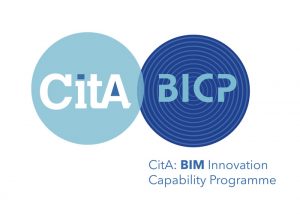Barry McAuley, DIT Lecturer and CitA Researcher, was recently appointed BIM Innovation Capability Programme (BICP) Post-Doctoral Researcher. He spoke to BIMIreland.ie about his appointment and explained the BICP.
The BICP provides a focus on the operational challenges associated with the adoption of BIM, latest studies on technology trends, best practice case studies and a comprehensive review of BIM implementation in international regions with a particular focus on enablers to support implementation. The BICP will seek to capture the capability of the Irish Construction Industry and the Higher Education Institutes to respond to the increased requirement for BIM on Irish construction and engineering projects.
The strategy is a direct response from Enterprise Ireland to recent initiatives from the European Parliament who have voted to amend European public procurement rules by recommending the use of electronic tools such as BIM, for public works contracts and design contests. Further to this the global adoption of BIM, with a particular focus on the move to Level 2 BIM by the UK, Ireland’s largest trading partner, has resulted in the requirement for a fast response to prevent loss of international contracts, exports and Irish-based employment. The BICP will be facilitated through the Construction IT Alliance (CitA) in partnership with the Dublin Institute of technology (DIT).
Barry told us about his duties as the post-doctoral researcher, “I will be responsible for the execution of the research strategy to ensure the aims and objectives of the BICP are achieved. I will be working alongside Dr Alan Hore (Principal Investigator), Professor Roger West (Advisory Research Supervisor), Suzanne Purcell (Accounts Manager), Dr William Hynes (Project Evaluator) and Stephen Purcell (Project Evaluator) throughout the two years of the project. The position was offered to me subject to completion of my PhD after a series of interviews. The BICP post-doctoral research position is partnered with the Arnold F. Graves Postdoctoral Scholarship within the School of Surveying and Construction Management in DIT.”
Barry described the main objective and work packages of the BICP in detail:
“The main objective of the BICP is to ensure that the Irish Construction Industry is in a strategic position to develop its BIM capabilities in line with these existing initiatives. To achieve the strategic objectives of the BICP the following four-stage work package approach has been developed:

Work Package Two will again consist of four phases with a focus on a field-based study, appraising the attitudes towards BIM from key stakeholders engaged in the Irish AEC sector. To achieve this phase one (2A) will consist of a number of half-day industry consultation workshops which will be used to fully identify the industry requirements and areas which require up-skilling to adopt BIM processes. Phase two (2B) is a planned systematic review of Higher Education Institutions (HEI) BIM programmes and BIM training currently on offer in Ireland. This will provide an opportunity to meet 3rd Level Institutions who are active in the delivery of BIM programmes to test the findings of Work Package One. Phase three (2C) will represent a period of consultation with a selection of public sector authorities that are active in the delivery of AEC projects. This will enable an investigation of current awareness, adoption and future plans for use of BIM. A number of working groups who have been established in response to the growing awareness of BIM whose deliberations and particular concerns will be captured, as part of phase four (2D). These working groups include the BIM Academic Group, BIM contracts and Procurement Group, BIM Client Group and BIM Quality and Standard Group.
Work Package Three once more will involve a four-phase process including a concentrated period where all data collated up to that point is analysed and reported. Phase one (3A) and two (3B) will provide in-depth analyse of BIM adoption in international regions with a particular focus on the enablers to support national implementation programmes. Further analysis will be undertaken in phase three (3C) in respect to the extent of response by 3rd Level Institutes, and private training bodies to delivering BIM education and if these offerings are improving the overall skill set of the Irish AEC sector in the use of BIM. Finally, an in-depth analysis will be carried out for phase four (3D) on the value proposition for the increased adoption of BIM on public AEC projects, with a particular focus on linking BIM to the wider strategic public policy direction of the Irish AEC Sector.
Work Package Four is the concluding BICP component, where the findings from the preceding work packages will be disseminated through a four-phase approach. This will be achieved through six bi-monthly provincial events (4A) that provide a flavour of the literature, consultation data and analysis gathered on the BICP. Conclusions will be disseminated through an Annual Conference (4B) that will seek to promote BIM Capability in the Irish AEC sector. There will be ten comprehensive case study reports (4C) detailing best practice with regards to BIM from Irish based companies. Finally, a working paper will be published (4D).
This data will be used in support of the National BIM Council (NBC) whose aim is to further encourage the wider Irish Construction Industry to realise the benefits that can be enabled through the adoption of BIM processes and technology.“
We asked when the Irish BIM community can expect publications. Barry said, “The aim is to have a steady flow of research which can be disseminated through either industry reports or academic publications. Once data from work package one has been successfully analysed there will be a continuous flow of information disseminated through CitA, Enterprise Ireland and DIT.”
Barry McAuley, BIM People Interview: https://bimireland.ie/2016/03/24/bim-people-barry-mcauley-lecturer-on-the-msc-in-construction-informatics-and-msc-in-applied-bim-management-at-dit-researcher-at-cita-phd-candidate/
Follow BIMIreland.ie on Twitter: @BIMIreland




